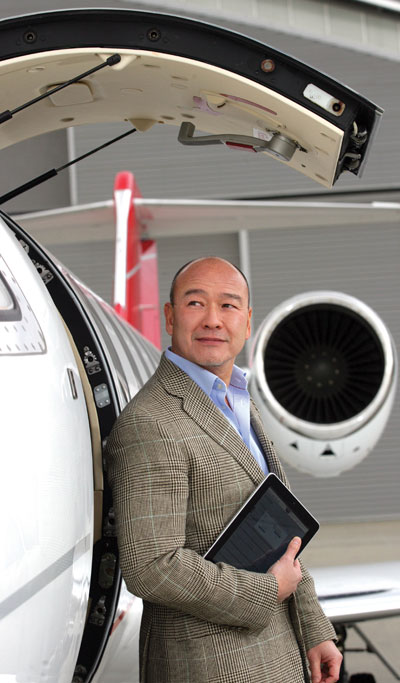
Features
Operations
Alternate Approach: Willing to pay a premium
Your humble correspondent does not live the high life very often.
January 9, 2012 By David Carr
Your humble correspondent does not live the high life very often. So, it was a rare treat to have recently flown between nearby city pairs aboard a private jet. Inside a 30-minute flight, a cabin attendant had covered tables with crisp white linen, served an appetizer, poured drinks, presented a light meal, offered dessert, removed the china and silverware and snapped everything back into place with minutes to spare before landing.
 |
|
| As one who has traditionally enjoyed the airport experience, the selling point of the private jet was side-stepping the hassle. PHOTO: VICTOR
|
On some airlines, it takes two hours to buy a beer and dried out sandwich even though ancillary services such as catering in economy (of which Alternative Approach was an early supporter) is supposed to be a profit envelope. My bartender (s) would not survive the day at that pace. Perhaps legacy airlines with fee-for-service cabins should consider allowing tips.
Granted, service is different in premium cabins where the passenger is less likely to be made to feel like a burden. Still, all cabins take off from the airport at the same time, and the premium passenger is subject to the same increasingly intrusive security checks, congestion and chronic delays as those of us squeezed into the main cabin. As one who has traditionally enjoyed the airport experience, the selling point of the private jet was not so much the in-flight service as it was side-stepping of the hassle.
“The premium passenger wants to be pulled out of the commercial airport and share a cabin with like-minded people who have the same values and standards,” said Clive Jackson, a British digital entrepreneur who recently launched Victor, an online private jet-booking platform.
Clearly there is opportunity in pulling premium passengers from the first- and business-class cabin into private aircraft. Fractional ownership has scaled that mountain but continues to struggle against those opposed to buying flying hours upfront. An air taxi industry supported by thousands of very light jets such as the Eclipse criss-crossing the country side has failed to live up to advance billing. Has Jackson’s Victor landed on the winning formula?
Jackson described Victor as the world’s first private jetshare community. It is a one-stop marketplace that has slashed the cost of private jet travel for customers and operators through the buying and selling of surplus seats. Members can charter a jet, sell extra seats or search for space on charters operated by Victor partners.
The Victor website – populated with fanciful photographs of private jets parked next to luxurious swimming pools and cruise ships – is loaded with options. Members can compare prices, view the exact aircraft they will fly on and post future trips to see if there are takers. Those wanting to book a seat can either reserve at the posted price (which will drop if the aircraft fills) or bid lower.
Membership is free and Victor collects a flat five per cent fee for charters it organizes. The real profit comes from selling seats, although Jackson argues that his service is distinct from a brokerage. “We are creating incremental bookings for our partners,” Jackson pointed out. “In the past, they have been completely dependent on brokers to get rid of excess inventory. We are offering direct booking that is very similar to an airline booking system, and giving operators a chance to recover up to 70 per cent of expenses.”
Operators are signing up. Victor now has 42 partner operators connecting its members with the largest chartered-fleet in Europe boasting a network of 940 destinations. Even so, 16 of the top 20 routes are to Palma de Mallorca from U.K., German and other European airports. Jackson owns a villa in the Spanish resort town and came up with the Victor business model after BMI suspended business-class service. For now, Victor is weighted more toward leisure travel, although the disappearance of business-class sections on some European flights may drive more corporate travellers to the website. “It is all very well talking about low-cost travel in Europe, but [airlines] are now busing the premium leisure market in horrible commercial aircraft and it is something they have to endure. Now a proportion of that market can say, ‘we don’t want to’. ”
The company has expanded into Germany and Switzerland, and is likely to arrive in the United States in 2012. Is there any opportunity for the Victor model to percolate into Canada? “It is not up to us,” Jackson said. “It is up to our members. Cross border or across the provinces – we have already shown that Victor will work. We only had one route four months ago.”
David Carr is a Wings writer and columnist.